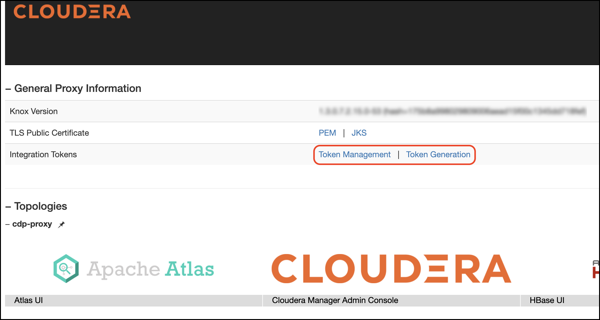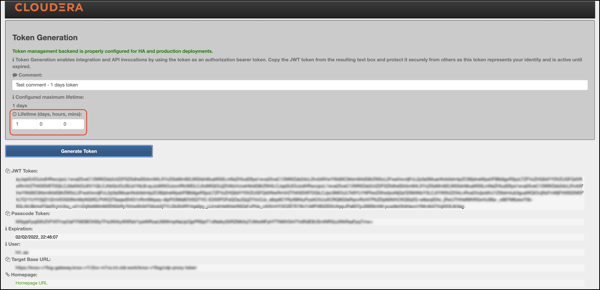Generate tokens
How to generate Knox gateway tokens from the Knox homepage.
-
To access Knox generation management, go to
https://KNOX_GATEWAY_HOST:PORT/GATEWAY_PATH/homepage/home,
e.g.
https://localhost:8443/gateway/homepage/home. Click on Token Generation.
-
The following sections are displayed on the page:
- Status bar: Message about the configured token state backend. There are
3 different statuses:
- ERROR: Displayed in red. Indicates a problem with the service backend which makes the feature not work. Usually, this is visible when end-users configure JDBC token state service, but they make a mistake in their DB settings.
- WARN: Displayed in yellow. Indicates that the feature is enabled and working, but there are some limitations.
- INFO: Displayed in green. Indicates when the token management backend is properly configured for HA and production deployments.
- Information label: Explains the purpose of the Token Generation page.
- Comment: Optional input field that allows end-users to add meaningful comments (mnemonics) to their generated tokens. The maximum length is 255 characters.
- Configured maximum lifetime: Informs the clients about the
knox.token.ttlproperty set in thehomepagetopology (defaults to 1 day(s)). If that property is not set (e.g. someone removes it from he homepage topology), Knox uses a hard-coded value of 30 seconds (aka. default Knox token TTL). - Custom maximum (token) lifetime: Can be set by adjusting the days/hours/minutes fields. The default configuration will yield one hour.

- Status bar: Message about the configured token state backend. There are
3 different statuses:
-
Click Generate Token.

-
Use the token to authenticate your request. Click the icon beside your choice
on the page to copy the value to the clipboard:
- JWT token: serialized JWT, fully compatible with the old-style bearer
authorization method. You can use it as the ‘Token’
user:
$ curl -ku Token:eyJqa3U[...]uT5AxQGyMMP3VLGw https:/localhost:8443/gateway/cdp-proxy-token/webhdfs/v1?op=LISTSTATUS {"FileStatuses":{"FileStatus":[{"accessTime":0,"blockSize":0,"childrenNum":1,"fileId":16386,"group":"supergroup", "length":0,"modificationTime":1621238405734,"owner":"hdfs","pathSuffix":"tmp","permission":"1777","replication":0, "storagePolicy":0,"type":"DIRECTORY"},{"accessTime":0,"blockSize":0,"childrenNum":1,"fileId":16387,"group":"supergroup", "length":0,"modificationTime":1621238326078,"owner":"hdfs","pathSuffix":"user","permission":"755","replication":0, "storagePolicy":0,"type":"DIRECTORY"}]}} - Passcode token: Serialized passcode token, which can be used as the
‘Passcode’
user:
$ curl -ku Passcode:WkRFMk1XTmh[...]RVNFpXRTA= https://localhost:8443/gateway/cdp-proxy-token/webhdfs/v1?op=LISTSTATUS {"FileStatuses":{"FileStatus":[{"accessTime":0,"blockSize":0,"childrenNum":1,"fileId":16386,"group":"supergroup", "length":0,"modificationTime":1621238405734,"owner":"hdfs","pathSuffix":"tmp","permission":"1777","replication":0, "storagePolicy":0,"type":"DIRECTORY"},{"accessTime":0,"blockSize":0,"childrenNum":1,"fileId":16387,"group":"supergroup", "length":0,"modificationTime":1621238326078,"owner":"hdfs","pathSuffix":"user","permission":"755","replication":0, "storagePolicy":0,"type":"DIRECTORY"}]}}
- JWT token: serialized JWT, fully compatible with the old-style bearer
authorization method. You can use it as the ‘Token’
user:
